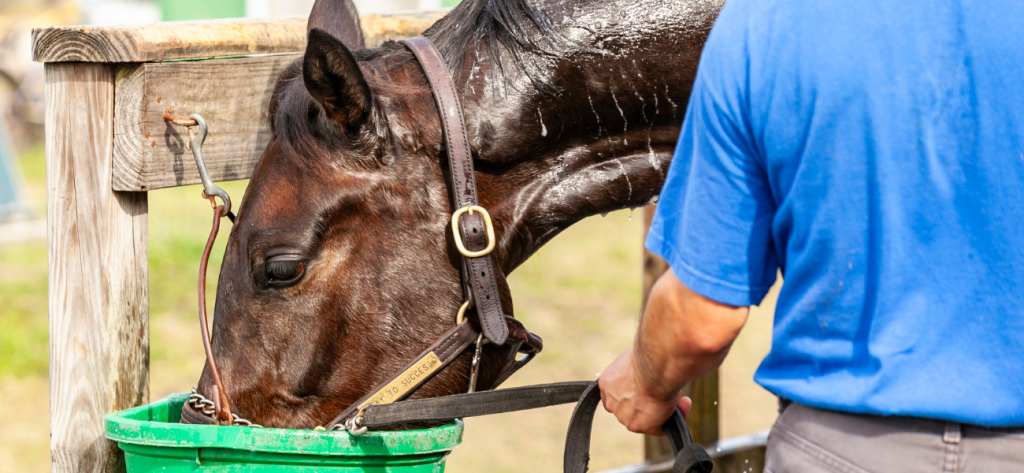Uncategorized
Horse Hydration During Transportation and Exercising in Summer Heat
Electrolytes for Horses and increased sweating
Heat stress in horses results in increased sweating and respiratory rate. As we get into the hot summer it’s especially important to think about when we are transporting and working horses as the heat brings an increase in sweating. The increase in sweating results in a considerable loss of water and electrolytes and requires you to properly rehydrate your horse. Horses require a lot of water and electrolytes, in the right balance.
Horses should be well hydrated before travel and exercise, this is especially important when it is hot. “The stomach and small intestines serve as a reservoir for uptake of water and electrolytes consumed 1 to 2 hours prior to exercise and transport” (1). Water and ions absorbed in the small intestine are used by the muscles and transported via blood to the skin where they replace the water lost due to sweating. Cl- is the predominant ion lost in sweat, followed by Na+, K+, Mg2+ and CA2+ (1). Effective electrolyte supplements are designed to provide the proper ratio of ions that are lost due to sweating. Providing electrolytes when horses are significantly sweating helps to maintain the right proportions of ions in the body that can be lost to sweat thus ensuring that the body is able to absorb the water and ions and body functions work as normal.
Oral electrolyte solution designed to replace ions lost in sweat is rapidly emptied from the gastrointestinal tract, rapidly absorbed in the upper intestinal tract and distributed through the body to replace the ions lost in sweat thus resulting in increased duration of submaximal exercise (2). Horse sweat has high concentrations of electrolytes and when water and electrolyte supplementation is inadequate the horses body functions are not fully supported and can lead to cardiovascular abnormalities, heat stress, poor performance, dehydration and colic (2). Dehydration in horses is very dangerous and can lead to impaction colic as the movement of water exits the hindgut. Signs of dehydration include muscle weakness, increased heart rate, impaired mental function, loss of skin elasticity, impaired cardiac recovery (1). Horses should have water and electrolytes before exercise or times of increased sweating, but if it is also important to provide electrolytes when trying to rehydrate a horse. Giving a dehydrated horse water only can lead to further dehydration (2).
In conclusion, horses lose both water and ions through sweat and both must be replaced in the correct concentration both before and after times of excessive sweating.
1.Lindinger MI. Oral Electrolyte and Water Supplementation in Horses. Veterinary Sciences. 2022; 9(11):626. https://doi.org/10.3390/vetsci9110626 https://www.mdpi.com/2306-7381/9/11/626
2.Lindinger, M.I. and Ecker, G.L. (2013), Gastric emptying, intestinal absorption of electrolytes and exercise performance in electrolyte-supplemented horses. Experimental Physiology, 98: 193-206. https://doi.org/10.1113/expphysiol.2012.065185 https://physoc.onlinelibrary.wiley.com/doi/full/10.1113/expphysiol.2012.065185

